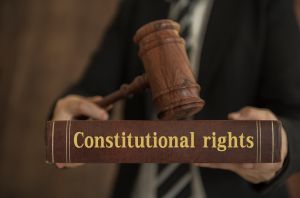
Here are the answers to some frequently asked questions about criminal law topics.
DON’T BE AFRAID TO ASK!
WHAT IS THE DIFFERENCE BETWEEN A FELONY AND A MISDEMEANOR?
Misdemeanor and felony charges differ primarily in the severity of the crime and penalties. In general, felony charges can result in jail time of at least a year and significant fines, while misdemeanors typically carry shorter jail sentences and lesser fines. Some charges, such as minor traffic violations, may carry fines as well as other penalties that have an impact on a motorist’s license.
WILL A CONVICTION AFFECT MY GUN RIGHTS?
In general, a felony conviction will disqualify you from possessing a gun in Wisconsin. Some misdemeanor convictions, such as for certain drug offenses or domestic violence, can also affect your ability to own a gun.
 WHAT HAPPENS TO MY BAIL MONEY ONCE IT IS POSTED?
WHAT HAPPENS TO MY BAIL MONEY ONCE IT IS POSTED?
When money is posted as bail (also called bond), it is regarded as a guarantee by the person posting it that the accused will behave himself while released. This means coming to court, not committing new crimes, and obeying the terms of the bond, such as not drinking alcohol.
If a person violates the terms of bond, the money posted can be forfeited, just like any breach of contract case. Additionally, the accused can be charged with new crimes for the violation.
When a case is completed, if the accused has not violated the terms of bond, the money posted first goes by law to any fines ordered by the court. Almost every case has fines involved, and it is pretty easy for fines to total more than the cost of the bond posted. In other words, oftentimes all the bond money posted will go to fines, but in almost every case some of it will. Whatever remains will be returned to the person who posted it by mail to the address they provide when it is posted.
WHAT ARE YOUR RIGHTS IF ARRESTED?
STOP TALKING …
Most people are familiar with the idea of being “read your rights,” including the right to remain silent. This is referred to as Miranda rights. Other rights that should be included in a Miranda warning include your right to have a lawyer with you during any interrogation. You have the right to invoke your Miranda rights at any time during an interrogation — for example, you can refuse to answer further questions without an attorney present. One important thing to remember is that police are only required to read you your rights if you have been arrested and are under interrogation. For example, if you have been pulled over under suspicion of drunk driving but not charged with a crime, the police officer will not necessarily read you your rights — but may very well use what you say against you.
WHEN CAN A JUVENILE BE TRIED AS AN ADULT?
In Wisconsin, juvenile court generally has jurisdiction over cases involving youth under age 17. In general, young people aged 17 and older are tried as adults. Youth as young as 14 can be tried as adults for certain felony changes, including murder, homicide and sexual assault.
 WHAT ARE MY RIGHTS IN A CRIMINAL CASE?
WHAT ARE MY RIGHTS IN A CRIMINAL CASE?
Going all the way back to the Constitution and the Declaration of Independence, the foundation of American Law declared a right to Liberty. Being put in jail, obviously, is the opposite of liberty, so the rights you have in a criminal case go back a long way. Here are some, and most of these have their roots in the Constitution itself.
· Due Process. You have a right not to have your
liberty taken away without appropriate
court proceedings.
· Trial. You may not be found guilty of a crime without a trial, unless you waive it.
· Jury. Only a jury may find you guilty. Unlike some other countries, a judge has no right to
just decide you did it.
· Counsel. You have a right to have a lawyer represent you. If you cannot afford one, one will
be provided to you at no cost.
· Silence. You know this one: You have a right to remain silent.
· Here's some free legal advice: USE IT.
· Presumption of Innocence. This is the legal term for innocent until proven guilty.
· Reasonable Doubt. You can only be found guilty is the prosecution proves it beyond a
reasonable doubt. That basically means that if the evidence is weak, or there is another
plausible explanation, the jury should not convict you, even if they are pretty sure you did
it.
· Searches. You have a right to be free from "unreasonable" searches of your person and
home, and of seizure (taking) of the belongings you have. This right has lost a lot of value
over the last few decades as many kinds of searches have been found to be "reasonable."
· Speedy, Public Trial. You have a right to be tried within a reasonable time in a public
setting. No secret trials or endless detentions.
DO I HAVE TO GIVE CONSENT FOR THE POLICE TO SEARCH MY CAR OR HOME?
No. That was not maybe, or at times you should. That was NO.
You never have to allow law enforcement to search your car or home, so what would you ever consent. In fact, allowing officers to search your home or vehicle will rarely benefit you. If police think they’re going to find something, they’ll probably try to convince you to let them look. It isn’t ever a good idea. They may promise to take it easy on you, but after they find evidence of a crime they’ll rarely do that. They may also threaten you, but you’re still not required to allow them to search. If police illegally search your property any evidence obtained must be suppressed (kept out) at trial. Make them do their jobs. Make them get a warrant for your home or find probable cause to search your vehicle.
If you have questions or are in need of any legal help, contact us today. Please contact us by text or phone at (414) 775-7445 or email at laura@jlfwisconsin.com anytime.
*Any articles in the Libra or posted by Jones Law Firm LLC are not legal advice for a particular client or situation. Further no attorney-client relationship is intended or created with this post.*

